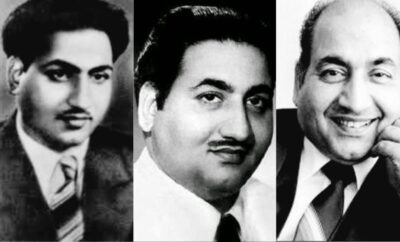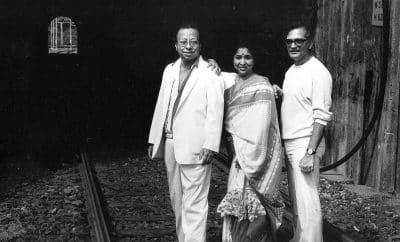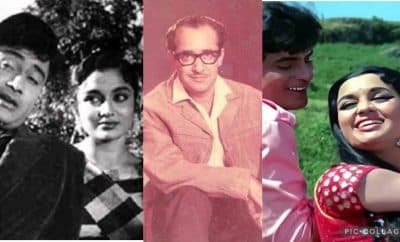Legends
Tribute to the Thespian – Dilip Kumar
According to the Greek tradition, the dramatist Thespis, of the 6th century B.C., was the inventor of tragedy and the first to write roles for the individual actor. We therefore get the word Thespian meaning a veteran actor (mainly a tragedian). In Hindi cinema, this name has been aptly given to Dilip Kumar.
With the passing away of Dilip Kumar, an era has ended in a true sense. He, along with his contemporaries, Raj Kapoor and Dev Anand, defines the golden era of Hindi cinema. The trinity laid the foundation of the commercial cinema where people thronged the theatres to watch their icons on screen, where people started to copy their style and mannerism.
Born as Muhammed Yusuf Khan on 11th December 1922, in Peshawar (now in Pakistan), Dilip Kumar was screen tested by none other than the first lady of Hindi cinema, Devika Rani and thus he made a debut with Bombay Talkies’ Jwar Bhata (1944). He was also given the screen name as Dilip Kumar (the other 2 name suggestions were Vasudev and Jehangir). The film did not do well at the box office but Dilip Kumar continued his stint with Bombay Talkies with films like Pratima (1945) and Milan (1946). The cultured discipline of Bombay Talkies set the footing for Dilip Kumar as an actor.
Things started to turn his way from Jugnu (1947) followed by Shaheed (1948). And there was no looking back after Mela (1948). Playing the lead role in romantic tragedies like Mela, Anokha Pyar, Andaz, Jogan, Babul, Deedar, etc, he earned the name – Tragedy king. He won the hearts of the audience through his boyish charm in films like Tarana, Sangdil, Aan, played a grey character in Amar (1954) and he broke that mould to become a mature man in Bimal Roy’s Devdas (1955) with the audience going ga-ga over his line – Kaun kambakht bardasht karne ke liye peeta hai….! Looking dapper throughout these films, Dilip Kumar brought in a lot of manly attitude on screen.
He bettered the aesthetic shine with Yahudi, Devdas, Madhumati, Musafir, Naya Daur, Footpath, Uran Khatola, Insaniyat, Paigham etc. and broke yet another mould of tragedy king by doing films like Azad and Kohinoor. His expressive silence reached the zenith with the epic Mughal-e-Azam (1960) and he went a step ahead with Ganga Jumna (1961) which was peppered with Bhojpuri dialogues.
With Leader (1964) and Dil Diya Dard Liya (1966) failing at the box office, there were speculations of his retirement from the industry. But he bounced back with double energy in Ram aur Shyam (1967). After Gopi and Sagina, Bairaag (1976) was his last film as a lead actor. Dilip Kumar returned on screen with Manoj Kumar’s Kranti (1981) after a hiatus of 5 years. But this time it was as a character actor. A year later it was clash of the titans in Ramesh Sippy’s Shakti. If we go through the repertoire of his films as a character actor, all his roles in those films are also centrally oriented. Mashaal, Mazdoor, Vidhata, Karma, Duniya, Saudagar to name a few.
It is usually films that define an actor but with Dilip Kumar it is the other way round. It is he who has defined the films. He has defined the process called method acting. Inspiring his contemporaries and the posterities likewise. Harikishan Giri Goswami screen named himself as Manoj Kumar after Dilip Kumar’s character in Shabnam (1949). Dilip Kumar inspired hundreds of actors including stalwarts like Rajendra Kumar, Manoj Kumar, Amitabh Bachchan and Shah Rukh Khan becoming an institution in himself. Every film of his can be considered as a milestone and every other performance as a text book for acting. In his career span of 5 decades, he has done only 54 odd films (excluding the cameos and guest appearances) making him a quality actor instead of quantity.
As they say – Legends never die, Dilip Kumar lives on with passion, pain and intensity on screen. He remains the undisputed king!




Preeti Paliwal
July 7, 2021 at 7:44 pm
Beautifully penned article Deepa..You rightly concluded Legends never Die…they are in our heart with memories forever..
Deepa
July 8, 2021 at 6:40 pm
Thank you Preeti 🙂
Anu Amlekar
July 7, 2021 at 7:45 pm
वाह दीपा बहोत खूब. तुमने उसे और चमका दिया। धन्यवाद गाने भी बेमिसाल चुने है। बहुत अच्छा लगा पढकर. सुहाने पुराने दिन याद दिला दिसे।
Deepa
July 8, 2021 at 6:40 pm
Thank you so much 🙂